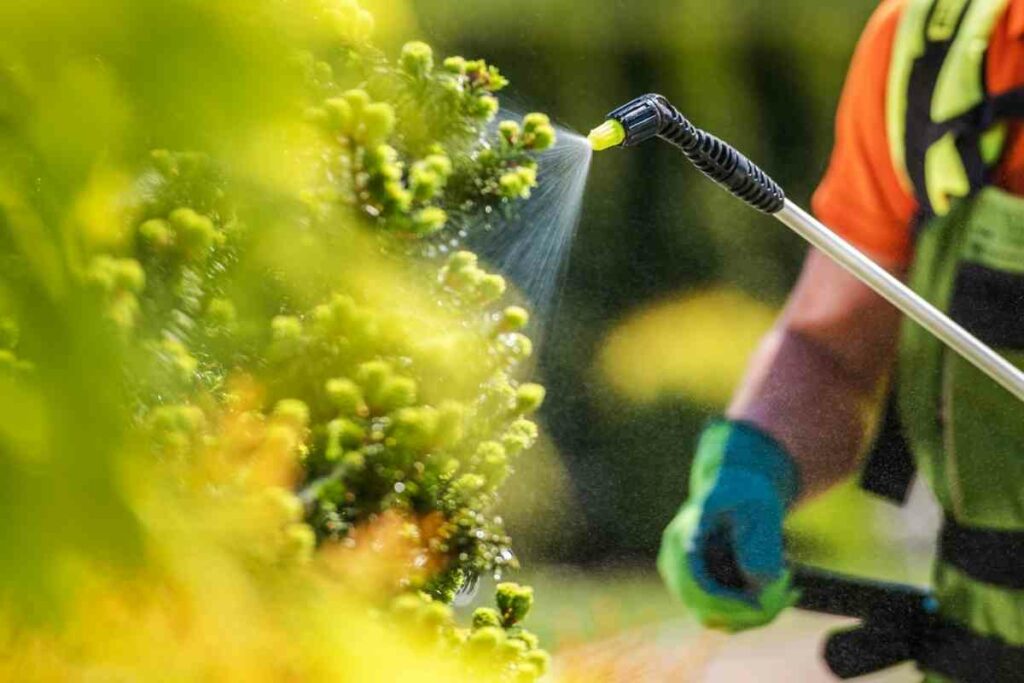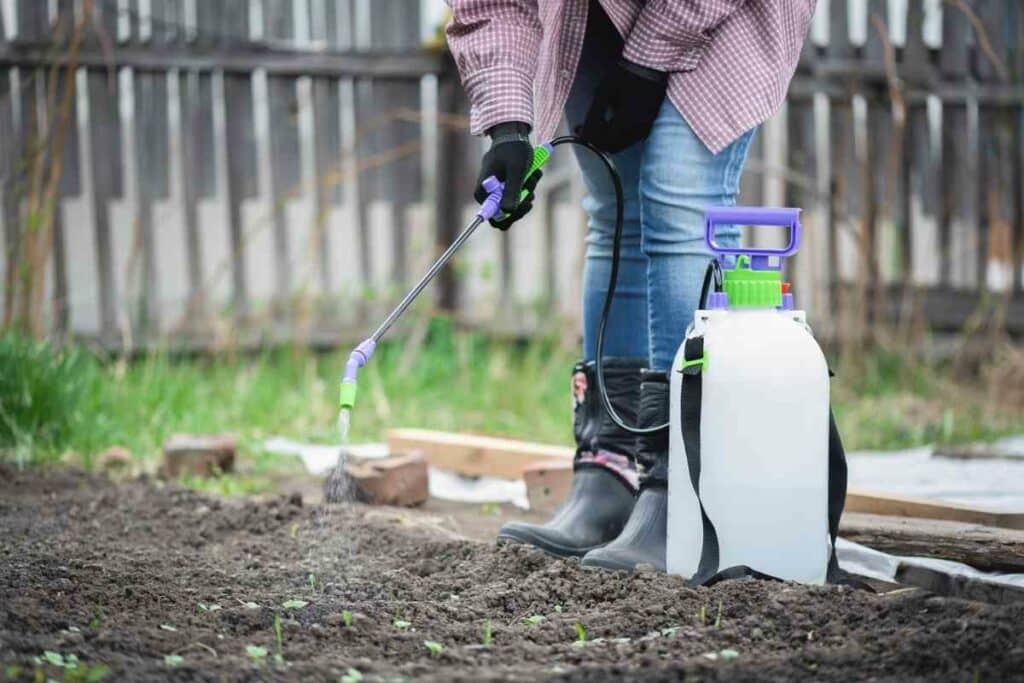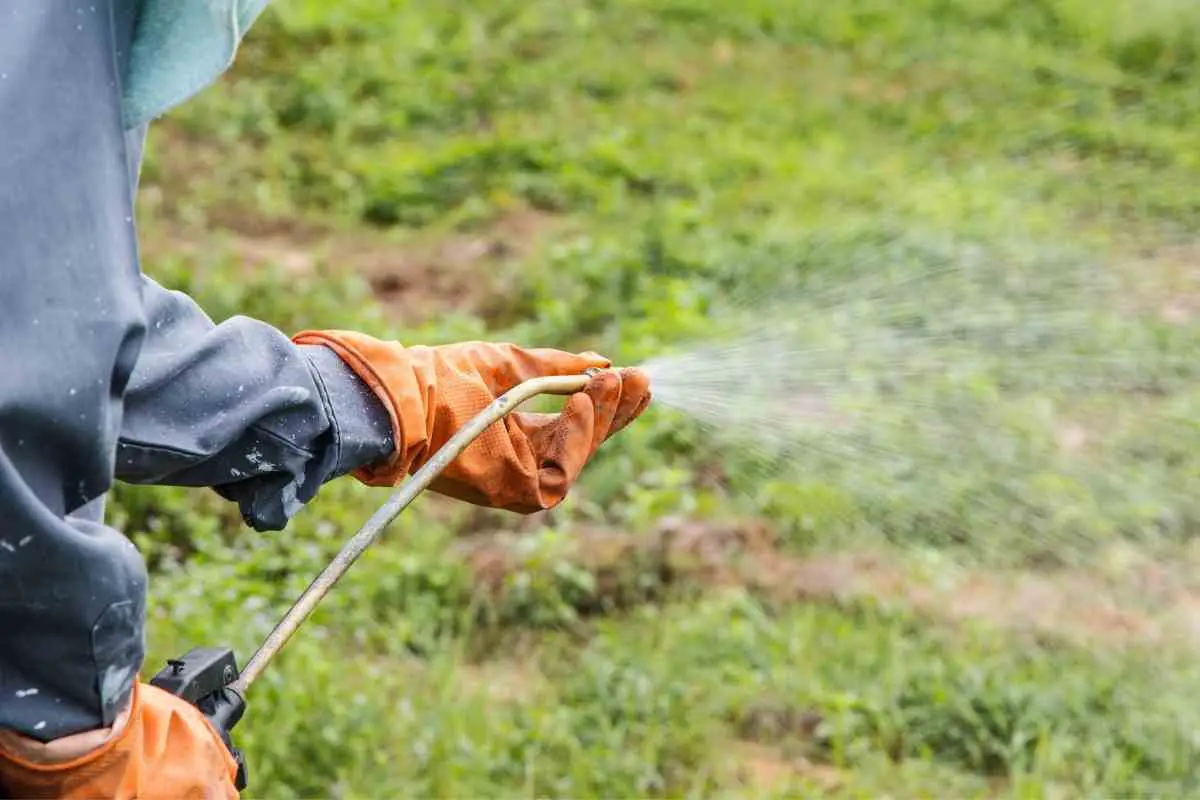Growing vegetables in your garden is fun until you find some pesky insects invading it.
However, there are ways to take care of such crawling insects. Using an organic insecticide for vegetable gardens is a safe option to control them.
Organic insecticides come from natural or plant-based sources, making them less harmful to the environment.
In addition, they are less likely to cause any harm to people and pets.
Here is a list of some of the best organic insecticides for use in vegetable gardens.
5 Best Organic Insecticide for Vegetable Garden
1. Monterey LG6135 Garden Insect Spray
If you’re dealing with insects such as caterpillars, fire ants, gypsy moths, and trips, this garden spray is a fantastic option for you. It is, however, not effective on aphids.
Its active ingredient is a bacteria known as spinosad, made through fermentation. This technology makes it safe for use around people and pets.
In addition, if you have issues with insecticide smells, you will be glad to know that this insecticide is odorless.
The Monterey garden spray acts fast after application, killing the insects within one or two days.
The spinosad makes this possible by affecting the insect’s nervous system.
One notable advantage of using a spinosad insecticide is that it doesn’t harm beneficial insects such as butterflies.
Pros
- Effective in killing various insects
- Odorless
- OMRI approved
Cons
- Ineffective on aphids
- Harmful to bees
- May damage some plants
To apply this insecticide to your garden, you can use a handheld, backpack, hose-end, or trigger sprayer.
Be sure to follow the user instructions before application.
2. PyGanic Gardening Botanical Insecticide
This PyGanic insecticide is made of pyrethrins, making it safe for people but deadly to insects.
It is pretty powerful and can kill over 200 varieties of crop-invading insects.
You can use it on various vegetables in your garden without them getting destroyed.
The insecticide is also OMRI listed and meets the standard of the National Organic Program.
Therefore, you can use it without worrying about your family’s safety, pets included.
It is best to spray this insecticide when the target insects are active to get the best results.
Spread it effectively to get good coverage as it works in contact with the insects.
Avoid using it when it’s raining as it will be washed away.
Pros
- Applicable to a wide range of plants
- Can get rid of over 200 insects
- It kills the insects immediately once they come into contact with it
Cons
- It does not provide residual killing; it only works when sprayed onto the invading insect
That said, the insecticide is usable at all plant growth stages. Follow the dilution instructions to achieve the optimum mixing ratios.
3. Natria Insecticidal soap
This insecticide will help you eradicate aphids, whiteflies, mealybugs, thrips, earwigs, mites, and other annoying pests.
It kills the insects in a matter of minutes. It is effective in the larval, nymph, and adult stages of the pests.
One great advantage of this insecticide is that it comes ready to use, with a sprayer built into the container.
Get proper coverage of the plants for optimal results, including the leaf undersides.
You can use this insecticidal soap for both outdoor and indoor plants.
It is safe for most edible crops, including small fruits like strawberries and blueberries.
Pros
- Suitable for indoor and outdoor use
- The easy-to-use bottle design
Cons
- Some users complained about plant burns
It’s ideal for use in every growth stage of the plants up to the harvesting season. If you need to reapply the insecticidal soap, do so every 7 to 14 days.
4. HARRIS Diatomaceous Earth
Diatomaceous Earth is a naturally occurring element that is usually mined. It is then ground to powder form for use as an insecticide.
It requires no additional ingredients. This Diatomaceous Earth is listed with OMRI as having reached organic use standards.
Diatomaceous Earth works by dehydrating the insect, absorbing all its fats and oils from the cuticle.
It is effective as long as it remains dry. In case it rains, one has to reapply it.
To use it, dust the plants that are under insect attack. Some insects it can kill include aphids, cutworms, slugs, snails, and Japanese beetles.
For slug control, you can sprinkle the dust on the ground where they are likely to be found.
The HARRIS Diatomaceous Earth is food grade, making it safe for people and pets.
Pros
- Food grade
- Packaging includes a duster
Cons
- Only effective when dry; not suitable for watered lawns
It is critical always to get the food grade type for use in your garden to avoid inhaling harmful contaminants.
5. PetraTools Pure Neem Oil
A derivative of the neem tree, neem oil is an effective insecticide used for household purposes.
As an insecticide, neem oil works as a repellant and hinders insect feeding.
It can also tamper with the insect’s hormones, making it difficult for them to grow and produce eggs.
This PetraTools neem oil is OMRI listed and is safe for indoor and outdoor use. Mix it with water and dish soap before spraying it on the plants.
Be sure to follow the mixing instructions given. Be careful not to apply too much neem oil as it may burn the plants, especially in hot weather.
Neem oil kills aphids, leaf miners, leafhoppers, caterpillars, whiteflies, and trips.
Besides insect control, neem oil can also manage fungal diseases such as powdery mildew.
Pros
- Higher level of effectiveness
- Perfect for both indoor and outdoor use
Cons
- May burn plants
This particular neem oil is highly effective due to its high Azadirachtin content.
This factor also gives it a higher utilization level than other brands with lower Azadirachtin levels.
Factors to Consider When Choosing an Organic Insecticide for Vegetable Gardens

When picking an insecticide to use in your vegetable garden, here is what to consider.
The type of insect
As you have noticed, different insecticides kill different insects.
It is essential to identify the insect you are dealing with before purchasing.
Confirm that the insecticide you pick will work well for your situation.
You should also consider the beneficial insects around your garden and go for insecticides that will not kill them.
In addition, consider the insect’s stage of growth.
While some insecticides may be suited for all growth stages, others may be appropriate for selected phases.
The type of plant
Similarly, some insecticides are better suited for particular plants than others.
It is advisable to search whether the insecticide you intend to buy will suit your plants.
Failure to do so may cost you some plants. You can also buy different insecticides for the other plants in your garden if necessary.
Keep In Mind – The plant’s growth stage also matters. Some insecticides are usable in all seasons, while others may only be effective in particular phases.
The speed of effectiveness
It is possible to fail to notice the insects in your garden until they are in large numbers.
If you are in such a scenario, it is best to use an insecticide that acts quickly.
This ensures that the problem is contained as soon as possible and you suffer minor damage.
The weather conditions
As you have seen, the effectiveness of some pesticides is affected by weather elements.
Some insecticides don’t do well in hot weather and may burn your plants.
If the temperatures at the time of application are high, you might want to consider alternative insecticides. The same applies to those affected by rain.
Safety Precautions When Using Organic Insecticides
Even though organic pesticides are safer than synthetic alternatives, they can still pose some hazards if used carelessly.
These measures will help safeguard you and your family from such harm.
Follow the manufacturer’s instructions
Before using any insecticide, it is advisable to read the manufacturer’s instructions carefully.
This information may include the dilution ratios and the amount of insecticide to apply.

Carefully follow these instructions to avoid any issues. In addition, dilute the insecticide in a well-ventilated area.
Heads Up! Do not be tempted to use more insecticide than stated.
You should also not mix more insecticide than you need in one instance. The insecticide may be ineffective the next time you need to use it.
Never mix different insecticides as it may result in an undesirable chemical reaction.
Wear protective clothing
The manufacturer’s instructions may also recommend protective wear.
These will include gloves, long-sleeved shirts, closed shoes, long pants, and goggles.
Ensure you dress as required and change into regular clothes after completing the application.
Thoroughly wash your hands after application and clean the protective clothing used appropriately.
Indoor use
When using your insecticide indoors, ensure that the area is well ventilated.
You should also get rid of personal items such as food, toys, and clothing to avoid contamination.
Keep kids, pets, and other humans not involved in the application, away from the area until the insecticide has dried.
Consider the weather conditions

Do not spray insecticides in windy weather as they may drift to other unwanted surfaces.
In addition, you should not spray in the rain as it will be washed off.
Storage
Always store insecticides in their original container for ease of identification.
It would also be best to keep them from children’s reach, preferably in a high and locked cupboard.
Know your first aid measures
It is advisable to know the first aid measures you may apply in any accidents. Check the product label for this information.
You can also check out more information from the poison control center.
Final Word
Organic insecticide for vegetable gardens is always best suited for pest control.
When you choose to use organic insecticides, you also protect the environment.
Check the shelf life stated and only buy what you need to use in that time frame.
It is also best to use the insecticides as soon as the invasion begins. Taking too long may lead to crop loss or low yield.
If you’re uncertain of what to do, seek the services of your local extension officer or related professionals. You will get the right advice and avoid going through unnecessary losses.
